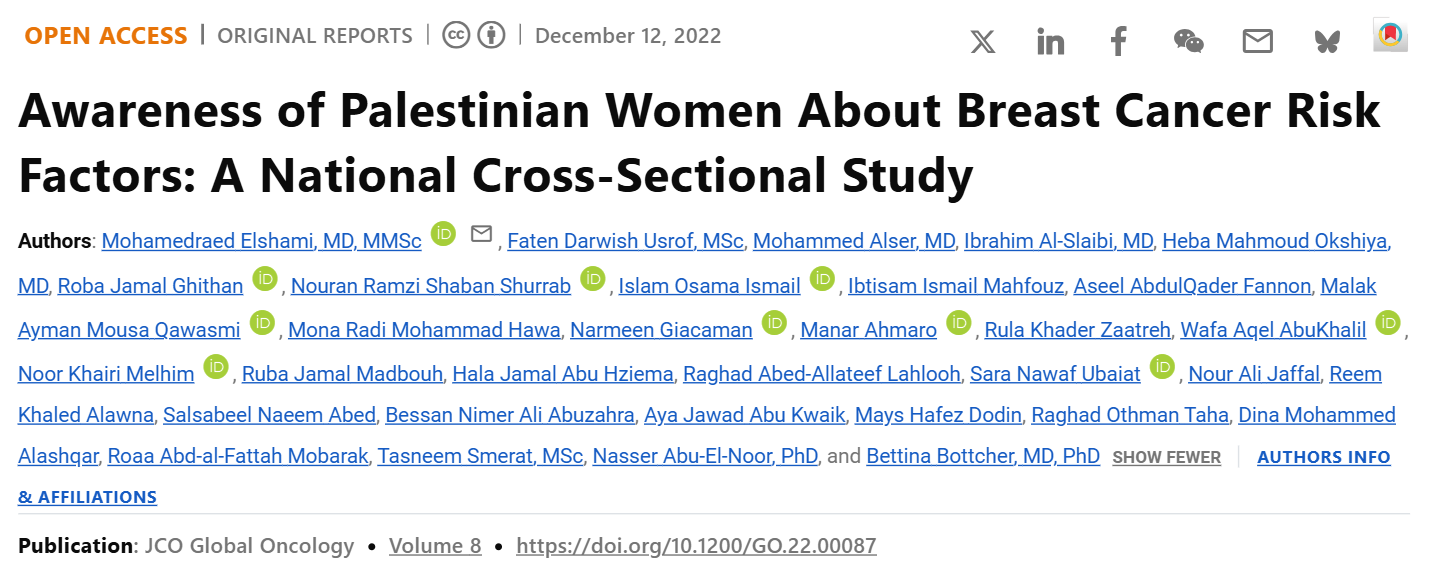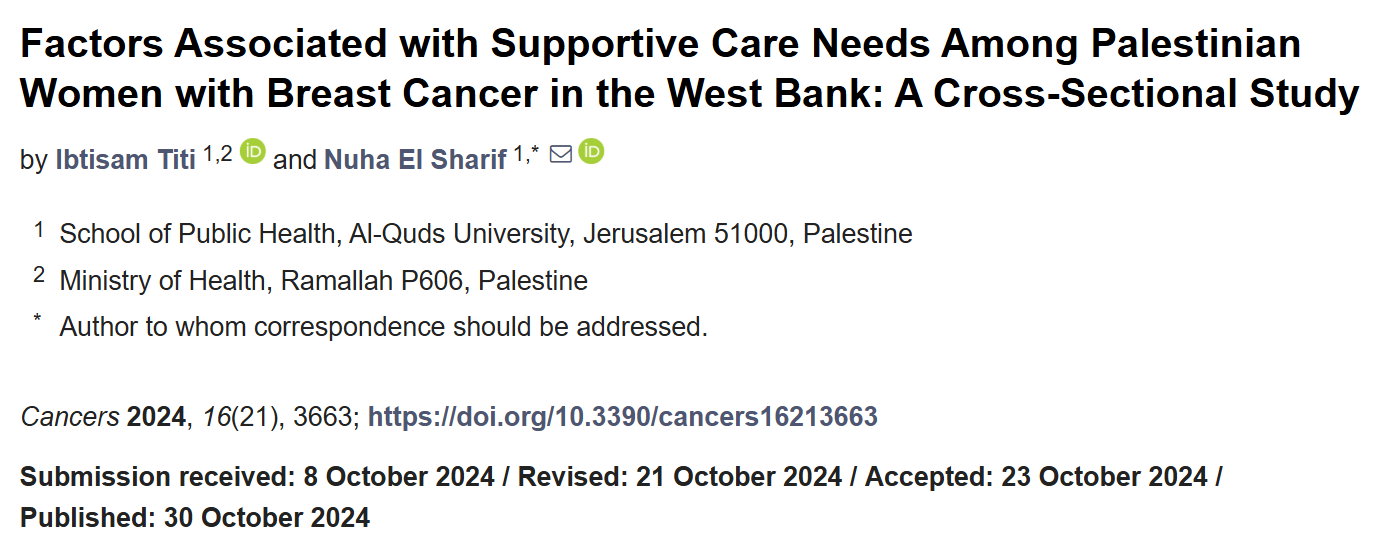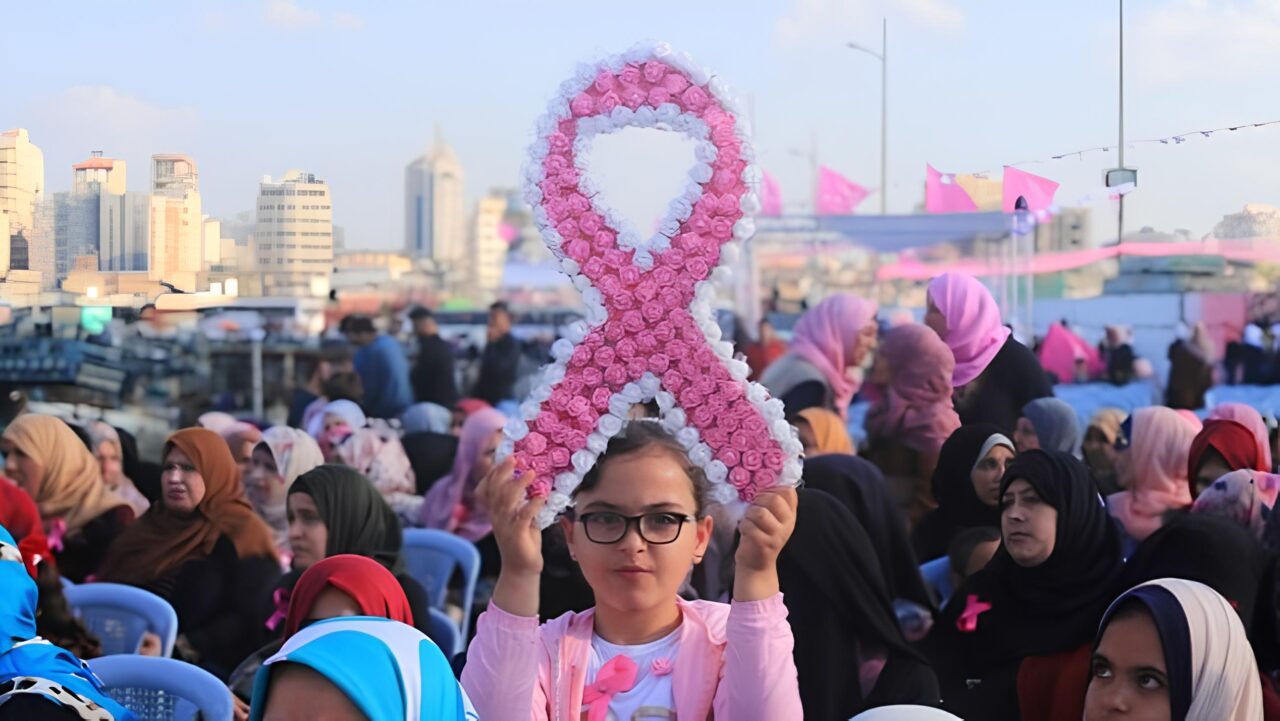“The most prevalent cancer among Palestinian women is breast cancer, which poses a serious threat to public health [1]. Current epidemiology, risk factors, diagnosis, and treatment challenges, and ongoing initiatives are reviewed in this article [2]. Evidence suggests a tendency towards late-stage presentation and a younger age at diagnosis [3]. Results are made worse by socioeconomic limitations, a lack of screening programs, and cultural barriers [4]. To lower morbidity and mortality in Palestine, measures to enhance early detection, increase treatment facilities, and carry out genetic and epidemiological research are crucial [1,4].
Introduction
About 20-25% of all female cancers in Palestine are breast cancers [1], and the average age at diagnosis is around 50 years old, which is younger than in Western populations [2]. Increased risk is influenced by lifestyle, family history, reproductive factors, and genetic predisposition [2]. Access to specialised care is limited, and many women present with advanced disease despite advancements in awareness and treatment [3]. For focused interventions and policy planning, it is essential to comprehend the epidemiological and clinical landscape of breast cancer in Palestine [4].
Methods
Peer-reviewed research, epidemiological reports, and local health surveys on breast cancer in Palestine served as the foundation for this review [2]. Studies describing incidence, risk factors, and healthcare challenges among Palestinian women were found by searching databases such as PubMed, PMC, MDPI, and ASCO publications [1]. English-language research with an emphasis on epidemiology, genetics, and public health initiatives that was published within the previous 15 years was one of the inclusion criteria [4].
Results and Findings
The study of epidemiology
In Palestine, breast cancer continues to be the most common cancer among women [1]. Perhaps as a result of improved detection, an ageing population, and changes in lifestyle, the incidence is increasing [2]. Compared to Western nations, early-onset breast cancer is more prevalent [3].
Risk Elements
Genetic mutations: Palestinian women have been found to have BRCA1 and BRCA2 mutations [2].
Challenges
- Nulliparity, late menopause, early menarche, and late first pregnancy are reproductive factors [4].
- Lifestyle factors include low consumption of fruits and vegetables, obesity, and a sedentary lifestyle [2].
- Family history is a powerful indicator of risk, especially for younger patients [1].
- Obstacles: Survival rates are decreased by late-stage presentation [3].
Initiatives
- Mammography availability and national screening programs are limited [1].
- limited access to healthcare as a result of geopolitical and socioeconomic factors [4].
- Medical consultation is delayed by stigma and cultural barriers [2].
Present-Day Projects
campaigns to raise awareness by the Ministry of Health and NGOs [2].
Discussion
Public health initiatives are highlighted by the high incidence and early onset of breast cancer among Palestinian women [1]. Poor outcomes are largely caused by socioeconomic constraints, limited access to care, and delayed diagnosis [4]. It is crucial to expand treatment facilities, raise public awareness, and fortify national screening programs [2]. Furthermore, studies on population-specific risk factors and genetic predisposition will inform customised prevention and treatment plans [2].
In conclusion
In Palestine, breast cancer is a significant public health concern [1]. To lower morbidity and mortality, early detection, better access to care, and population-specific research are essential [4]. To achieve long-lasting improvements in breast cancer outcomes, cooperation between governmental entities, non-governmental organisations, and international partners is crucial [2].”
Written by Amanda Nasrallah, Fifth-year Medical Student at Al-Quds University, and Palestine National Delegate at IASSS (International Association of Student Surgical Societies).
1. Title: Awareness of Palestinian Women About Breast Cancer Risk Factors: A National Cross-Sectional Study
Authors: Mohamedraed Elshami, Faten Darwish Usrof, Mohammed Alser, Ibrahim Al-Slaibi, Heba Mahmoud Okshiya, Roba Jamal Ghithan, Nouran Ramzi Shaban Shurrab, Islam Osama Ismail, Ibtisam Ismail Mahfouz, Aseel AbdulQader Fannon, Malak Ayman Mousa Qawasmi, Mona Radi Mohammad Hawa, Narmeen Giacaman, Manar Ahmaro, Rula Khader Zaatreh, Wafa Aqel AbuKhalil, Noor Khairi Melhim, Ruba Jamal Madbouh, Hala Jamal Abu Hziema, Raghad Abed-Allateef Lahlooh, Sara Nawaf Ubaiat, Nour Ali Jaffal, Reem Khaled Alawna, Salsabeel Naeem Abed, Bessan Nimer Ali Abuzahra, Aya Jawad Abu Kwaik, Mays Hafez Dodin, Raghad Othman Taha, Dina Mohammed Alashqar, Roaa Abd-al-Fattah Mobarak, Tasneem Smerat, Nasser Abu-El-Noor, and Bettina Bottcher
You can read the Full Article in JCO Global Oncology.

2. Title: Risk Factors for Breast Cancer in the Gaza Strip, Palestine: a Case-Control Study
Authors: Mueen Kariri, Marwan O. Jalambo, Basil Kanou, Saleh Deqes, Samaher Younis, Baker Zabut, and Usama Balawi
You can read the Full Article in Clinical Nutrition Research.

3. Title: Breast Cancer in Women in Gaza: A Review of Clinical Characteristics and Short-Term Survival
Authors: Shaymaa AlWaheidi, Richard Sullivan, and Elizabeth A. Davies
You can read the Full Article in JCO Global Oncology.

4. Title: Factors Associated with Supportive Care Needs Among Palestinian Women with Breast Cancer in the West Bank: A Cross-Sectional Study
Authors: Ibtisam Titi and Nuha El Sharif
You can read the Full Article in Cancers.

You can find more posts featuring Amanda Nasrallah on OncoDaily.


